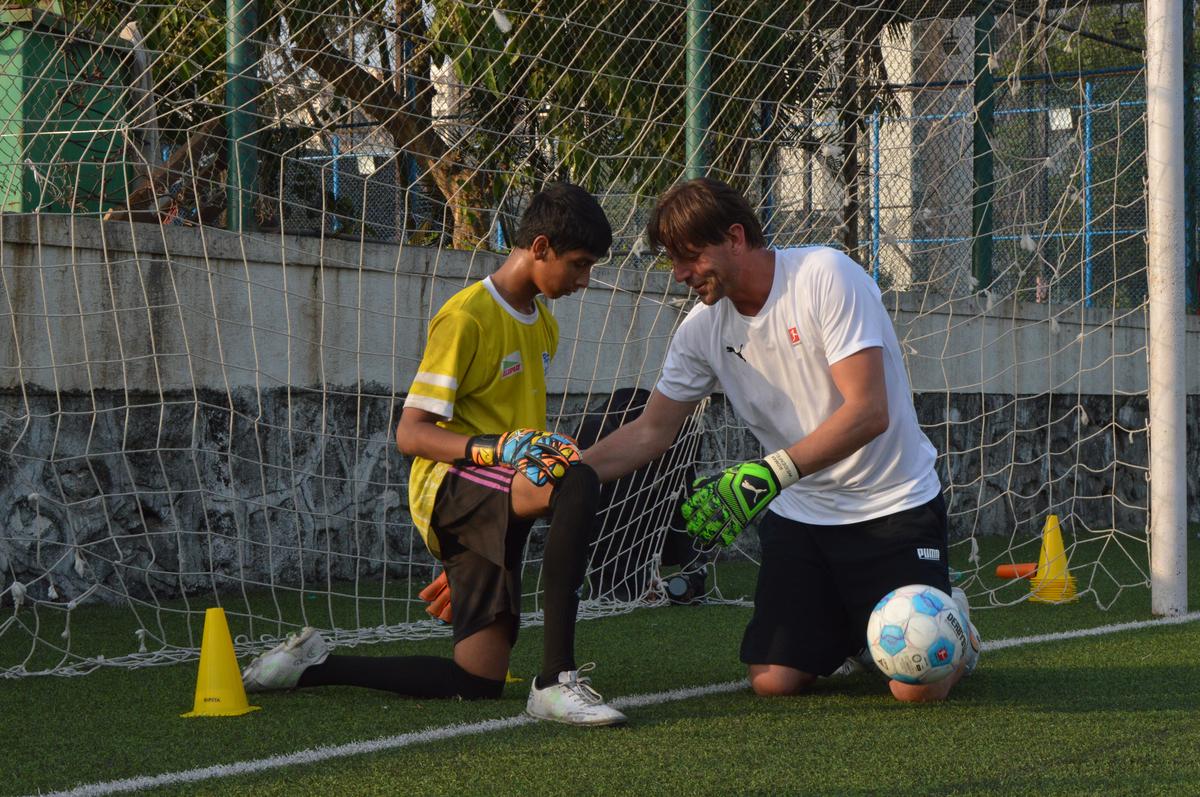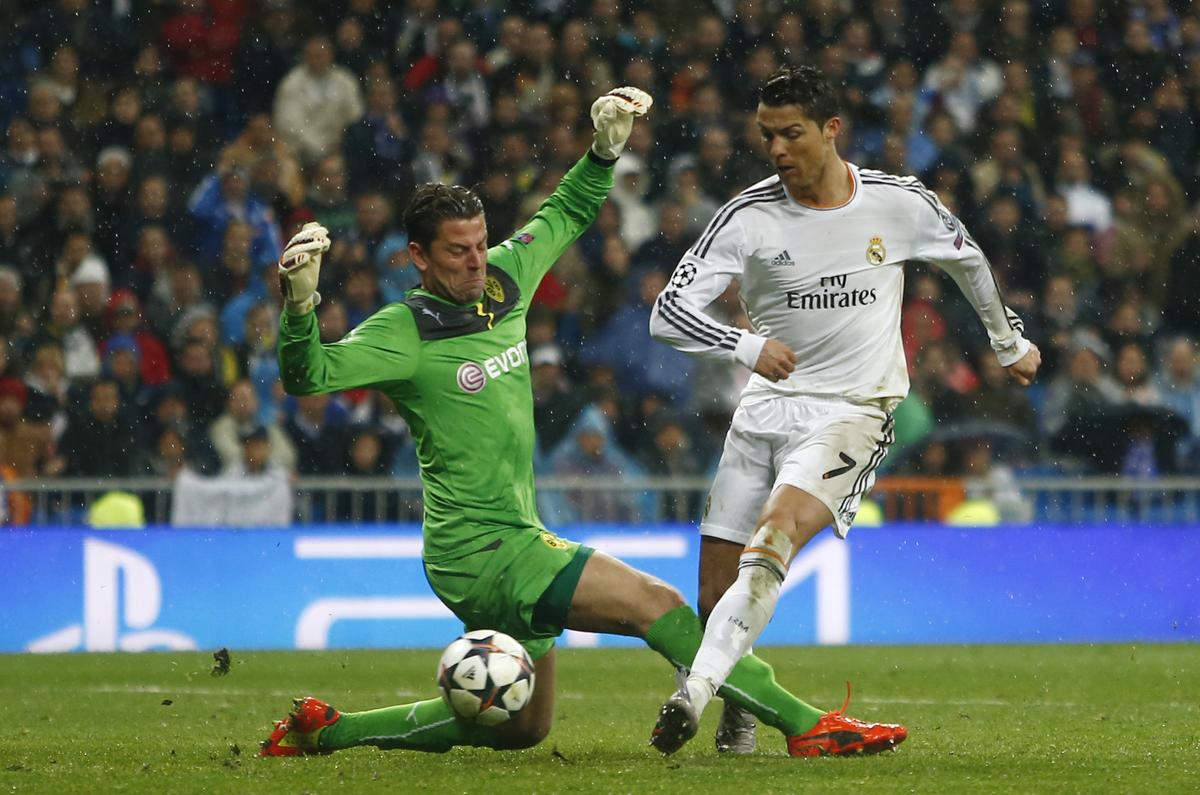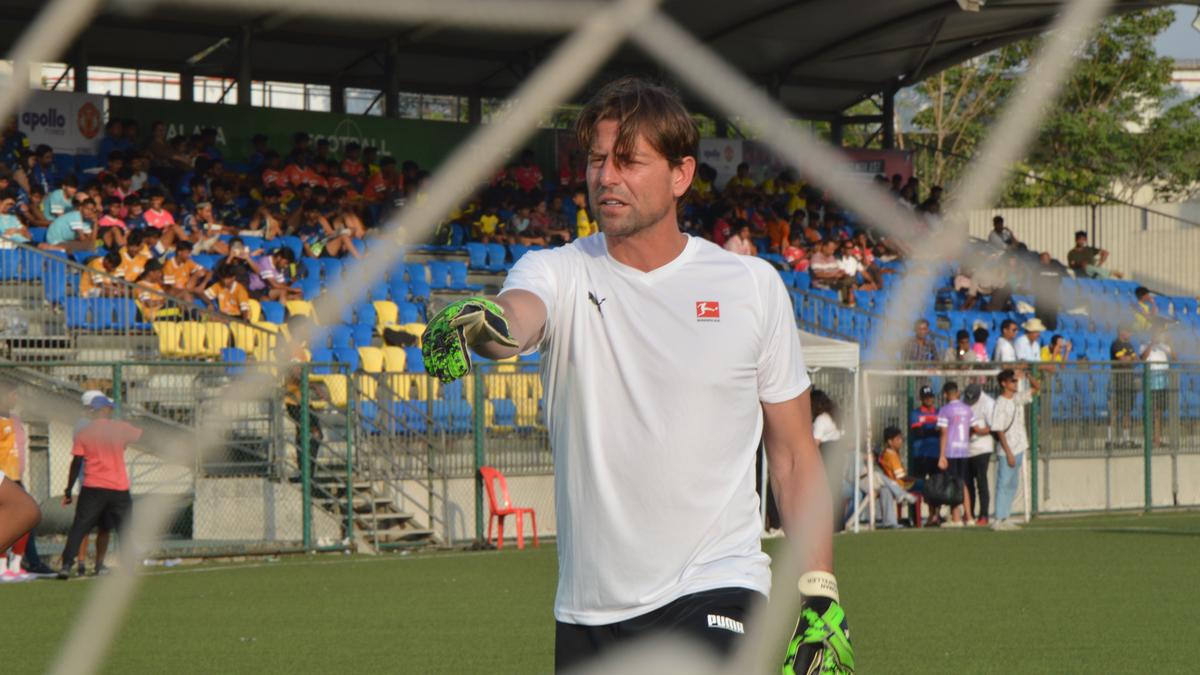Roman Weidenfeller, one of German football’s most celebrated goalkeepers and a 2014 World Cup winner, was in India in April to inspire the next generation. The long-time Borussia Dortmund star, who lifted multiple Bundesliga and DFB-Pokal trophies, is here as part of the Bundesliga Dream project, a talent-scouting initiative that brings promising young Asian footballers to Germany for elite training and exposure to European competition. In Mumbai, Weidenfeller and youth coaches from VfB Stuttgart and SV Darmstadt 98 will hand-pick players from India’s under-13 and under-15 ranks for a possibly life-changing stint at top academies. Roman spoke to The Hindu over Zoom from Mumbai to reflect on his career and India’s footballing future.

Roman Weidenfeller working with aspiring Indian footballers
| Photo Credit:
Special Arrangement
Is this your first time in India?
No, this is my second time. I have previously visited Mumbai and Bangalore in 2020, just before the pandemic. I remember catching the last flight back to Germany before everything shut down.
What did you like about your last visit, and what are you looking forward to doing now?
The people here are wonderful; it’s always great to be in India. The food is a bit spicy for me, but very good. Interestingly, when I returned to Germany, I actually missed the traffic on India’s streets!
You spent over 16 years at Borussia Dortmund. If the goalposts at Signal Iduna Park could speak, what moments do you think they would remember most from your career?
My first title in 2011 was one of the biggest moments. Winning that Bundesliga title with Dortmund was incredible. Then in 2012, we did the double, winning both the Bundesliga and the DFB-Pokal. We also reached the Champions League final, though we lost to Bayern Munich. They weren’t the better team, but they had more luck that day.
A year later, I reached the pinnacle of my career by winning the World Cup with Germany in Brazil. Over my career, I won the Bundesliga twice and the DFB-Pokal twice. I’ve played in many finals — while I’m proud, there’s always a part of me that wishes I’d won one more title.
You faced some of the greatest forwards of all time like Lionel Messi and Cristiano Ronaldo. Who was the most difficult for you to read, and why?
Yes, the names you mentioned are right. But Cristiano Ronaldo was incredibly difficult to read because of his relentless work ethic and confidence. I played against him many times, at Real Madrid and later at Juventus. I also faced Robert Lewandowski, who was my teammate at Dortmund before he moved to Bayern Munich. He continues to play exceptionally well, recently winning a title with Barcelona. I’ve played against many strong strikers, like Messi, Gonzalo Higuaín, and others. But Ronaldo stands out. He’s always the first in the dressing room, working hard in the gym and on the pitch, and the last to leave. His dedication has kept him at the top for so long, and now he’s continuing his career in Saudi Arabia.

Roman Weidenfeller and Cristiano Ronaldo
| Photo Credit:
AP
As part of Germany’s 2014 World Cup squad, what’s one behind-the-scenes moment fans might not know about?
After our first game against Portugal, we had a big party. Before that match, no one really knew where we stood or what to expect. Playing in Brazil was tough — the heat was around 35 degrees Celsius, making everything more challenging. But after we won 4-0, we celebrated at our camp in Campo Bahia. That party brought the team closer, and it was fantastic to be part of such a united group. That first win gave us a huge confidence boost for the rest of the tournament.
You had a long career and played in some of the biggest matches. What was your routine for getting ready for a big game?
I always followed the same routine, especially for night games. In the morning, we’d have breakfast, followed by a short training session to warm up. After lunch, I’d take a nap to recharge. In the afternoon, we’d prepare to go to the stadium. I always trained my mind by watching videos of my performances and listening to music to get into the right mindset. Before the match, I’d switch off my phone to avoid distractions and focus completely.
Bundesliga is growing in India, with more people watching every year. Do you follow Indian football?
Yes, I’ve followed the Indian Super League (ISL) over the years. Some of my former teammates have played in the ISL. For example, Manuel Friedrich, who was with Mainz 05 and Dortmund, spent some time in India. I also remember Patrick Owomoyela considering a move here, though it didn’t happen in the end. The growth of Indian football is impressive, and it’s exciting to see the increasing interest and development.
What can Indian fans learn from the Bundesliga in terms of youth training, fan culture, or club identity?
Indian football is growing fast, and there’s so much potential here. There are many people eager to learn and develop through academies. The fans are fantastic—sometimes the stadiums are sold out! Indian football is definitely on the rise.
Finally, if 20-year-old Roman were listening to you today, what advice would you give your younger self?
Have fun with what you do. First and foremost, enjoy playing football and stay focussed. Work hard, accept the rules, and maintain discipline. It’s also really important to build good relationships with your teammates. That’s something you learn along the way, and it helps you both on and off the pitch.
Sony Sports Network is the official broadcaster of Bundesliga in India
Published – May 09, 2025 01:25 pm IST


